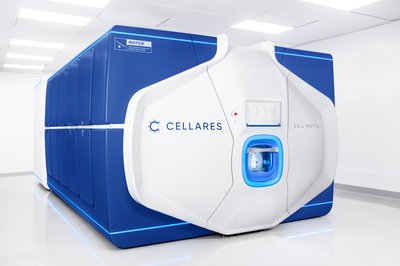In the fast-evolving world of biotech, Cellares stands out for tackling one of the industry’s most urgent problems: scaling life-saving cell therapies.
Headquartered in San Francisco with a Chicago office located at TeamWorking by TechNexus, Cellares was born from the vision to fix the bottlenecks in manufacturing. And in doing so, Cellares has grown into a global cell therapy innovator.
The inspiration for Cellares came from a simple, but profound gap: while cell therapies like CAR-T showed tremendous promise, their production was slow, manual, and costly. Patients eligible for these treatments often faced long waitlists, with an estimated 20% dying before receiving therapy.
Backed by $355 million in total funding, the company set out to solve this bottleneck with a bold new approach to manufacturing.
Cellares’ solution? Rethink manufacturing itself. The company introduced the concept of an Integrated Development and Manufacturing Organization (IDMO)—a new category that moves beyond the traditional CDMO (Contract Development and Manufacturing Organization) model.
Through proprietary technologies like the Cell Shuttle and Cell Q, Cellares is making it possible to manufacture ten times as many doses within the same footprint, at up to 50% lower batch costs.
The company’s smart factories, including facilities under construction in New Jersey, Europe, and Japan, represent a future where waitlists disappear, costs drop, and life-saving therapies reach more patients worldwide.
Growing with Global Reach, and Chicago Roots
Since its founding, Cellares has expanded rapidly. With a headquarters and R&D center in South San Francisco, the company also established a strong presence in Chicago—growing its software engineering team from a handful to over a dozen.
Chicago plays a critical role in Cellares’ technology evolution. Here, engineers focus on building the software systems that control and monitor the Cell Shuttle’s manufacturing processes. By shifting manufacturing variability into software rather than hardware, Cellares has created a more flexible, cost-effective production model.
Chicago’s thriving community of healthcare and biopharmaceutical technologists offers valuable opportunities to collaborate, network, and innovate, Cellares Software Engineering Lead Brian Fors said.
"It’s been great to bring in new ideas and technologies from the broader Chicago tech ecosystem," he added.
TeamWorking by TechNexus, the Perfect Fit
When it came time to establish a Chicago base, TeamWorking by TechNexus was a natural choice. Beyond just flexible office space, the environment provided Cellares with a reliable, adaptable setting to support rapid team growth.
“TeamWorking has been great for hosting our quarterly software planning sessions, networking with other technologists, and fostering collaboration within our team,” Fors said.
The community-driven events, from rooftop gatherings to breakfast networking sessions, offered the Cellares Chicago team opportunities to build connections, share ideas, and stay plugged into the city's vibrant tech scene.
The flexibility, location, and support offered by TeamWorking also helped the team to stay nimble and productive as they scaled up.
A Look Ahead
The next five to ten years look transformative for Cellares. As cell therapy becomes more mainstream, Cellares aims to set the standard for manufacturing, making treatments as accessible and seamless as prescribing a pill or infusion.
By continuing to build smart factories and refining their integrated systems, the company said they plan to continue expanding globally, reaching even more patients in need.
With innovation at its core and a collaborative spirit nurtured by communities like TeamWorking, Cellares is well on its way to changing the future of medicine.
